The HyperTexts
The Best Labor Day Poems, Songs, Quotes and Epigrams
Who wrote the best Labor Day poems and songs? These are, in one person's
opinion and for whatever it's worth, the best poems and songs
about the working classes and human labor.
compiled by Michael R. Burch,
editor-in-chief of The HyperTexts
This is my favorite work-related song:
You load sixteen tons, what do you get?
Another day older and deeper in debt.
Saint Peter don't you call me, 'cause I can't go:
I owe my soul to the company store!
—"Sixteen Tons" was written by Merle Travis and made famous by
Tennessee Ernie Ford
These are my favorite lines from my favorite hymn about human labor:
Work, for the night is coming,
when man works no more ...
—Annie Louisa Walker Coghill
This is my favorite saying about human toil:
A man may work from sun to sun
but a woman's work is never done.
—Traditional proverb, author unknown
Having served as an editor for three decades, and having worked long and hard to
help catch and correct errors in other writers' poems, I came up with a
variation of the proverb above:
Ars Brevis, Proofreading Longa
by Michael R. Burch
Poets may labor from sun to sun,
but their editor's work is never done.
These are some of my favorite work-related quotes and epigrams. If you like
them, you're welcome to share them, but please be sure to cite the author and
translator.
•
Little sparks may ignite great Infernos.—Dante, translation
by Michael R. Burch
•
He who follows will never surpass.—Michelangelo, translation by Michael R. Burch
•
Time is sufficient for anyone who uses it wisely.—Leonardo da Vinci,
translation by Michael R. Burch
• You can crop all the flowers but you cannot detain spring.—Pablo Neruda, translation by Michael R. Burch
•
No wind is favorable to the man who lacks
direction.—Seneca the Younger, translation by Michael R. Burch
•
Experience is the best teacher but a hard
taskmaster.—Michael R. Burch
•
The danger is not aiming too high and missing, but aiming too low and hitting
the mark.—Michelangelo, translation by Michael R. Burch
Whatever you need to do tomorrow, do today,
for time evaporates and vanishes like a mist.
Thus work undone remains undone forever.
—Kabir Das, loose translation/interpretation by Michael R. Burch
This poem alludes to the Garden of Eden and the origins of women's labor ...
First Fig
by Edna St. Vincent Millay
My candle burns at both ends;
It will not last the night;
But ah, my foes, and oh, my friends—
It gives a lovely light!
It's not just women who have tough jobs. This poem, written by the greatly
undervalued African-American poet Robert Hayden, is surely the best one ever
about an unappreciated father's herculean labors ...
Those Winter Sundays
by Robert Hayden
Sundays too my father got up early
and put his clothes on in the blueblack cold,
then with cracked hands that ached
from labor in the weekday weather made
banked fires blaze. No one ever thanked him.
I'd wake and hear the cold splintering, breaking.
When the rooms were warm, he'd call,
and slowly I would rise and dress,
fearing the chronic angers of that house,
Speaking indifferently to him,
who had driven out the cold
and polished my good shoes as well.
What did I know, what did I know
of love's austere and lonely offices?
Love can be a distraction from work ...
An Attempt
by Erich Fried
loose translation by Michael R. Burch
I have attempted
while working
to think only of my work
and not of you,
but I am encouraged
to have been so unsuccessful.
Two Insomnias
by Rumi
loose translation/interpretation by Michael R. Burch
When I’m with you, we’re up all night;
when we’re apart, I’m unable to sleep.
Thank God for both insomnias
and their inspiration.
The great Indian poet Rabindranath Tagore said hard, honest work was next to
godliness ...
Gitanjali 11
by Rabindranath Tagore
loose translation/interpretation by Michael R. Burch
Leave this vain chanting and singing and counting of beads:
what Entity do you seek in this lonely dark temple with all the doors shut?
Open your eyes and see: God is not here!
He is out there where the tiller tills the hard ground and the paver breaks
stones.
He is with them in sun and shower; his garments are filthy with dust.
Shed your immaculate mantle and likewise embrace the dust!
Deliverance? Where is this "deliverance" to be found
when our Master himself has joyfully embraced the bonds of creation; he is bound
with us all forever!
Cease your meditations, abandon your petals and incense!
What is the harm if your clothes become stained rags?
Meet him out there in the toil and the sweat of his brow!
And now, without further ado,
here are
my personal choices for the best Labor Day poems and songs ...
My top ten poems and songs about human labor are:
•
"Those Winter Sundays" by
Robert Hayden
•
"Sixteen Tons" written by Merle Travis and most famously sung by
Tennessee Ernie Ford
•
The poem-become-a-hymn "Jerusalem" by William Blake with
its "dark satanic mills" of modern industry
•
William Blake's lovely and very touching
poems about the dangerous labors of child chimneysweeps
•
"Joe Hill" written
by Alfred Hayes, as performed by Paul Robeson, Phil Ochs and Joan Baez
•
"Take
this Job and Shove It" written by David Allen Coe, as performed by Johnny
Paycheck
•
"Allentown" by Billy Joel
•
"Born in the USA" by Bruce Springsteen
•
"9
to 5" by Dolly Parton
•
The war poems of
Wilfred Owen, Isaac Rosenberg, Randall Jarrell and other war poets.
High Honorable Mention Poems: "The Forge" and "Digging" by Seamus Heaney, "Chicago" by
Carl Sandburg, "Uphill" by Christina Rossetti, "Not in Vain" by Emily Dickinson,
"Beginning My Studies" by Walt
Whitman, "Ozymandias" by Percy Bysshe Shelley, "London" by William Blake, "The
Village Blacksmith" and "Psalm of Life" by Henry Wadsworth Longfellow
High Honorable Mention Songs: "Chain Gang" by Sam Cooke, "40 Hour Week" by Alabama, "Get a Job" by the Silhouettes, "Five O'Clock
World" by the Vogues, "She Works Hard for the Money" by Donna Summer, "Lady
Marmalade" by Patti Labelle, "King of the Road" by Roger Miller, "Coal Miner's
Daughter" by Loretta Lynn, "Workin' Man Blues" by Merle Haggard, "Union Maid"
written by Woody Guthrie as performed by Pete Seeger and the Almanac Singers,
"Money for Nothing" by Dire Straits, "Working Class Hero" written by John Lennon
as performed by Green Day, "I've Been Workin' on the Railroad" by Johnny Cash
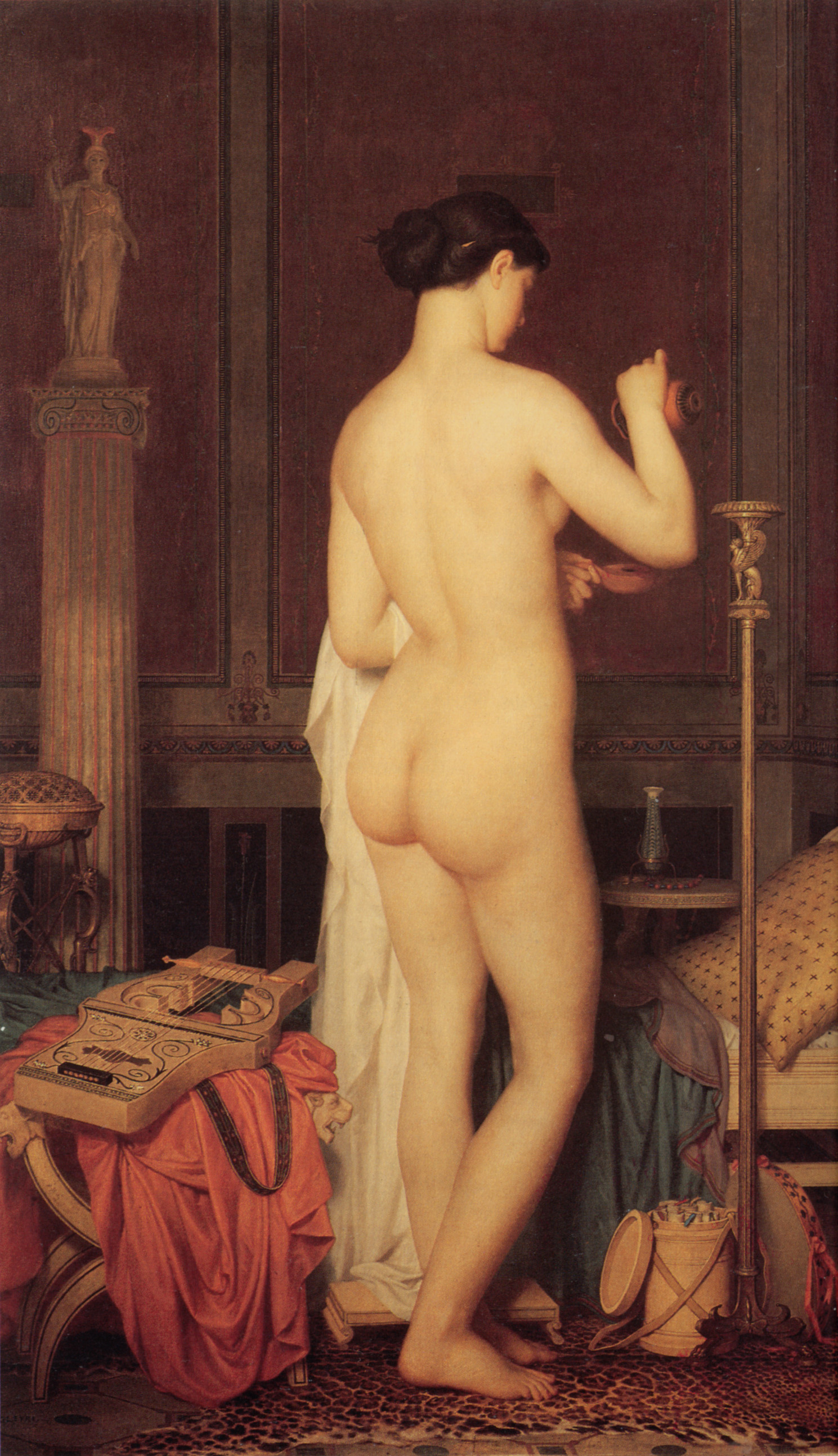
Gleyre Le Coucher de Sappho
by Marc-Charles-Gabriel Gleyre
Sappho of Lesbos is perhaps the first great female poet known to us today, and
she remains one of the very best poets of all time, regardless of gender. The
poem below reminds me of the most difficult and painful labor of all: a woman's
labor during childbirth. It also reminds of the ancient rhyme that "A man
may toil
from sun to sun / but a woman's work is never done."
Sappho, fragment 58
loose translation by Michael R. Burch
Pain
drains
me
to
the
last
drop
.
Seamus Heaney's "The Forge" describes one of the most arduous trades: that of
the village blacksmith ...
The Forge
by Seamus Heaney
All I know is a door into the dark.
Outside, old axles and iron hoops rusting;
Inside, the hammered anvil’s short-pitched ring,
The unpredictable fantail of sparks
Or hiss when a new shoe toughens in water.
The anvil must be somewhere in the centre,
Horned as a unicorn, at one end and square,
Set there immoveable: an altar
Where he expends himself in shape and music.
Sometimes, leather-aproned, hairs in his nose,
He leans out on the jamb, recalls a clatter
Of hoofs where traffic is flashing in rows;
Then grunts and goes in, with a slam and flick
To beat real iron out, to work the bellows.
Want to talk about a really tough job? ...
Randall Jarrell was one of the better war poets, and this is his most famous
poem, and justly so. He worked in a control tower during World War II, after not
being able to pass flight training as a pilot. This poem describes how difficult
and dangerous an airman's career can be ...
The Death of the Ball Turret Gunner
by Randall Jarrell
From my mother's sleep I fell into the State,
And I hunched in its belly till my wet fur froze.
Six miles from earth, loosed from its dream of life,
I woke to black flak and the nightmare fighters.
When I died they washed me out of the turret with a hose.
Students who complain about homework should consider the "Walt Whitman approach"
to learning ...
Beginning My Studies
by Walt Whitman
Beginning my studies the first step pleas'd me so much,
The mere fact consciousness, these forms, the power of motion,
The least insect or animal, the senses, eyesight, love,
The first step I say awed me and pleas'd me so much,
I have hardly gone and hardly wish'd to go any farther,
But stop and loiter all the time to sing it in ecstatic songs.
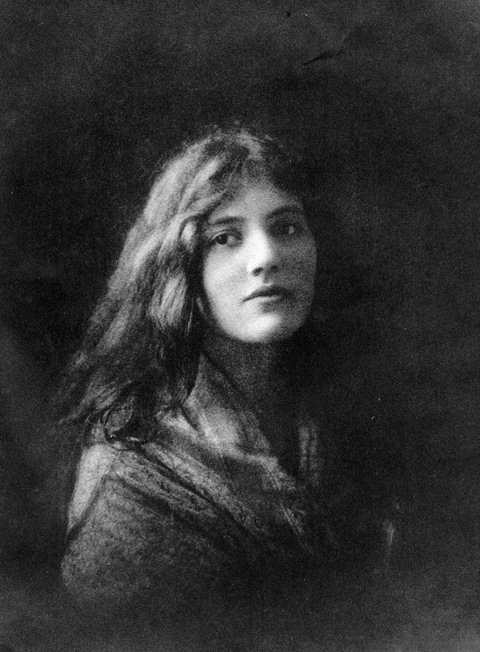
William Butler Yeats was the most famous Irish poet of all time, and his poems
of unrequited love for the beautiful and dangerous revolutionary Maud Gonne
helped make her almost as famous as he was in Ireland. The first poem below is
Yeats' loose translation of a Pierre Ronsard poem, in which Yeats imagines the
love of his life in her later years, tending a waning fire. Growing old is no
easy job, and it's harder to grow old apart than together ...
When You Are Old
by William Butler Yeats
When you are old and grey and full of sleep,
And nodding by the fire, take down this book,
And slowly read, and dream of the soft look
Your eyes had once, and of their shadows deep;
How many loved your moments of glad grace,
And loved your beauty with love false or true,
But one man loved the pilgrim soul in you,
And loved the sorrows of your changing face;
And bending down beside the glowing bars,
Murmur, a little sadly, how Love fled
And paced upon the mountains overhead
And hid his face amid a crowd of stars.
William Butler Yeats also wrote one of the best war poems in the English
language, about an aviator, his friend Robert Gregory, who did his job without
really believing in it ...
An Irish Airman Foresees His Death
by William Butler Yeats
I know that I shall meet my fate
Somewhere among the clouds above;
Those that I fight I do not hate,
Those that I guard I do not love;
My country is Kiltartan Cross,
My countrymen Kiltartan's poor,
No likely end could bring them loss
Or leave them happier than before.
Nor law, nor duty bade me fight,
Nor public men, nor cheering crowds,
A lonely impulse of delight
Drove to this tumult in the clouds;
I balanced all, brought all to mind,
The years to come seemed waste of breath,
A waste of breath the years behind
In balance with this life, this death.

Anne Sexton was a model who became a confessional
poet, writing about intimate aspects of her life, after her doctor suggested
that she take up poetry as a form of therapy. She studied under Robert Lowell at
Boston University, where Sylvia Plath was one of her classmates. Sexton won the
Pulitzer Prize for Poetry in 1967, but later committed suicide via carbon
monoxide poisoning. Topics she covered in her poems included adultery,
masturbation, menstruation, abortion, despair and suicide. The poem below
discusses another very difficult and painful form of labor: burying our dead.
The Truth the Dead Know
by Anne Sexton
For my Mother, born March 1902, died March 1959
and my Father, born February 1900, died June 1959
Gone, I say and walk from church,
refusing the stiff procession to the grave,
letting the dead ride alone in the hearse.
It is June. I am tired of being brave.
We drive to the Cape. I cultivate
myself where the sun gutters from the sky,
where the sea swings in like an iron gate
and we touch. In another country people die.
My darling, the wind falls in like stones
from the whitehearted water and when we touch
we enter touch entirely. No one's alone.
Men kill for this, or for as much.
And what of the dead? They lie without shoes
in the stone boats. They are more like stone
than the sea would be if it stopped. They refuse
to be blessed, throat, eye and knucklebone.
"Ozymandias" by Percy Bysshe Shelley illustrates why all human labor is
ultimately futile ...
Ozymandias
by Percy Bysshe Shelley
I met a traveller from an antique land
Who said: Two vast and trunkless legs of stone
Stand in the desert. Near them, on the sand,
Half sunk, a shattered visage lies, whose frown,
And wrinkled lip, and sneer of cold command,
Tell that its sculptor well those passions read
Which yet survive, stamped on these lifeless things,
The hand that mocked them, and the heart that fed;
And on the pedestal these words appear:
"My name is Ozymandias, king of kings:
Look on my works, ye Mighty, and despair!"
Nothing beside remains. Round the decay
Of that colossal wreck, boundless and bare
The lone and level sands stretch far away.
"Uphill" by Christian Rossetti may be a poem about finding rest at the end of a
long day, or about finding rest at the end of a long and difficult life, or
perhaps both ...
Uphill
by Christina Rossetti
Does the road wind up-hill all the way?
Yes, to the very end.
Will the day's journey take the whole long day?
From morn to night, my friend.
But is there for the night a resting-place?
A roof for when the slow dark hours begin.
May not the darkness hide it from my face?
You cannot miss that inn.
Shall I meet other wayfarers at night?
Those who have gone before.
Then must I knock, or call when just in sight?
They will not keep you standing at that door.
Shall I find comfort, travel-sore and weak?
Of labour you shall find the sum.
Will there be beds for me and all who seek?
Yea, beds for all who come.
In the poem below Ezra Pound captures something of the misery of the faceless
masses in a modern subway station ...
In A Station Of The Metro
by Ezra Pound
The apparition of these faces in the crowd:
Petals on a wet, black bough.
The great Welsh poet Dylan Thomas discusses a very different kind of labor in
his poem "In My Craft or Sullen Art" ...
In My Craft or Sullen Art
by Dylan Thomas
In my craft or sullen art
Exercised in the still night
When only the moon rages
And the lovers lie abed
With all their griefs in their arms,
I labour by singing light
Not for ambition or bread
Or the strut and trade of charms
On the ivory stages
But for the common wages
Of their most secret heart.
Not for the proud man apart
From the raging moon I write
On these spindrift pages
Nor for the towering dead
With their nightingales and psalms
But for the lovers, their arms
Round the griefs of the ages,
Who pay no praise or wages
Nor heed my craft or art.
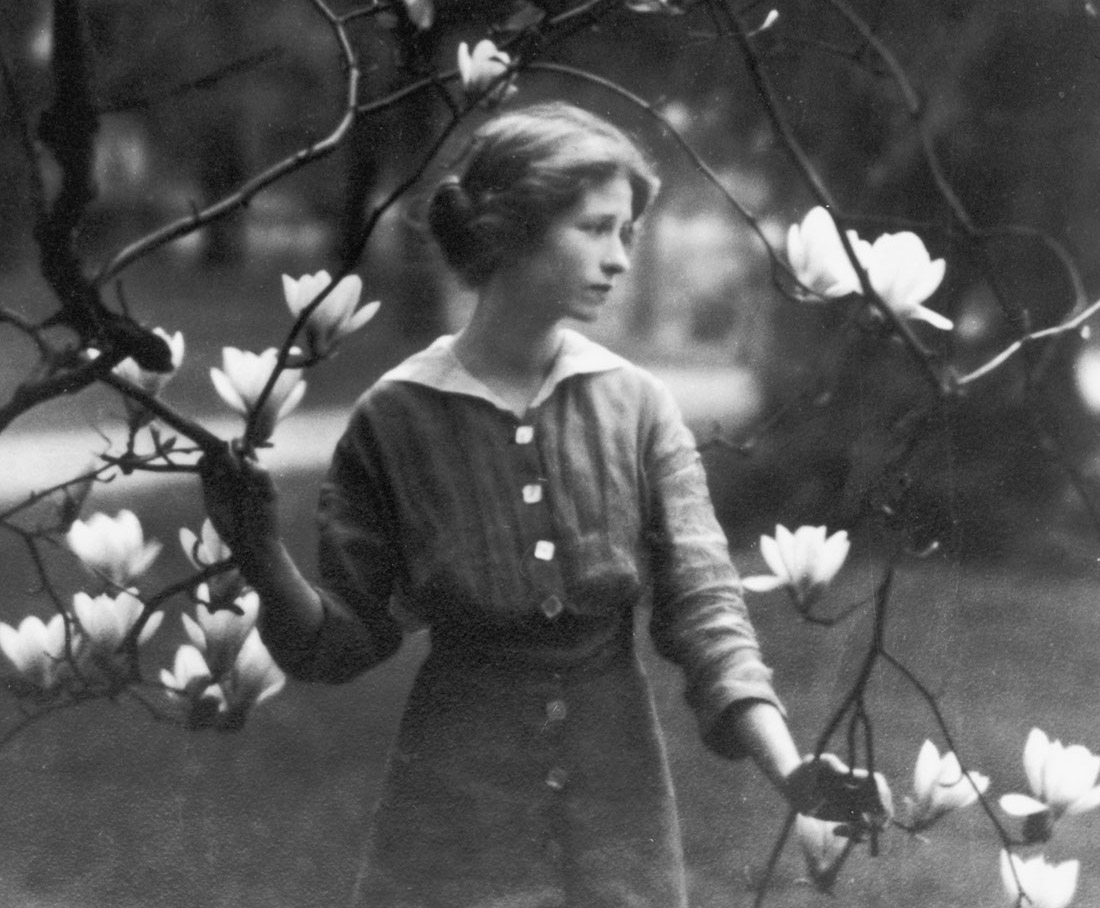
Edna St. Vincent Millay was the first woman to win a Pulitzer Prize for poetry.
Her 1920 poetry collection A
Few Figs From Thistles drew controversy for its novel exploration of female
sexuality. She made the point that having relationships with men was hard work,
and not always incredibly rewarding ...
I, Being Born a Woman, and Distressed
by Edna St. Vincent
Millay
I, being born a woman, and distressed
By all the needs and notions of my kind,
Am urged by your propinquity to find
Your person fair, and feel a certain zest
To bear your body's weight upon my breast:
So subtly is the fume of life designed,
To clarify the pulse and cloud the mind,
And leave me once again undone, possessed.
Think not for this, however, this poor treason
Of my stout blood against my staggering brain,
I shall remember you with love, or season
My scorn with pity — let me make it plain:
I find this frenzy insufficient reason
For conversation when we meet again.
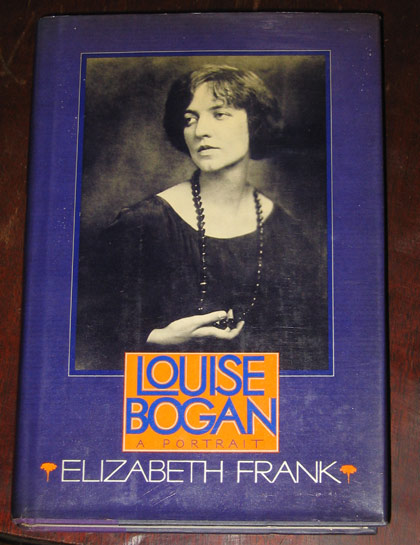
Louise Bogan is one of the best unknown or under-known poets of all time. Her
best poems make her a major poet, in my opinion. In her lovely poem "Song for
the Last Act" she describes how difficult it is to reach the end of life and
face parting from our loved ones ...
Song For The Last Act
by Louise Bogan
Now that I have your face by heart, I look
Less at its features than its darkening frame
Where quince and melon, yellow as young flame,
Lie with quilled dahlias and the shepherd's crook.
Beyond, a garden. There, in insolent ease
The lead and marble figures watch the show
Of yet another summer loath to go
Although the scythes hang in the apple trees.
Now that I have your face by heart, I look.
Now that I have your voice by heart, I read
In the black chords upon a dulling page
Music that is not meant for music's cage,
Whose emblems mix with words that shake and bleed.
The staves are shuttled over with a stark
Unprinted silence. In a double dream
I must spell out the storm, the running stream.
The beat's too swift. The notes shift in the dark.
Now that I have your voice by heart, I read.
Now that I have your heart by heart, I see
The wharves with their great ships and architraves;
The rigging and the cargo and the slaves
On a strange beach under a broken sky.
O not departure, but a voyage done!
The bales stand on the stone; the anchor weeps
Its red rust downward, and the long vine creeps
Beside the salt herb, in the lengthening sun.
Now that I have your heart by heart, I see.
Walter Savage Landor describes the acceptance of the inevitable toward the end
of one's life ...
On His Seventy-Fifth Birthday
by Walter Savage Landor
I strove with none, for none was worth my strife;
Nature I loved, and next to Nature, Art;
I warmed both hands before the fire of Life;
It sinks, and I am ready to depart.
Walt Whitman explained why some jobs seem like more trouble than they're worth
...
When I Heard The Learn'd Astronomer
by Walt Whitman
When I heard the learn'd astronomer,
When the proofs, the figures, were ranged in columns before me,
When I was shown the charts and diagrams, to add, divide, and measure them,
When I sitting heard the astronomer where he lectured with much applause in the
lecture-room,
How soon unaccountable I became tired and sick,
Till rising and gliding out I wander'd off by myself,
In the mystical moist night-air, and from time to time,
Look'd up in perfect silence at the stars.
William Dunbar's wonderful "Sweet Rose of Virtue" is one of my favorite
poems from the good auld days of English poetry. It describes the difficulties
of gardening, as a metaphor for the difficulties of human relationships ...
Sweet Rose of Virtue
by William Dunbar [1460-1525]
loose translation by Michael R. Burch
Sweet rose of virtue and of gentleness,
delightful lily of youthful wantonness,
richest in bounty and in beauty clear
and in every virtue that is held most dear―
except only that you are merciless.
Into your garden, today, I followed you;
there I saw flowers of freshest hue,
both white and red, delightful to see,
and wholesome herbs, waving resplendently―
yet nowhere one leaf nor petal of rue.
I fear that March with his last arctic blast
has slain my fair rose and left her downcast,
whose piteous death does my heart such pain
that I long to replant love's root again―
so comforting her bowering leaves have been.
Conrad Aiken, in his best poems, rivals Wallace Stevens and Hart Crane as
masters of modern English poetic meter. Aiken's "Bread and Music" is one of my
very favorite poems, regardless of era. It describes the difficulty of dealing
with the loss of someone cherished ...
Bread and Music
by Conrad Aiken
Music I heard with you was more than music,
And bread I broke with you was more than bread;
Now that I am without you, all is desolate;
All that was once so beautiful is dead.
Your hands once touched this table and this silver,
And I have seen your fingers hold this glass.
These things do not remember you, belovèd,
And yet your touch upon them will not pass.
For it was in my heart you moved among them,
And blessed them with your hands and with your eyes;
And in my heart they will remember always,—
They knew you once, O beautiful and wise.
D. H. Lawrence is better known today for his novels than for his poetry, but "Piano"
is an immortal poem, and thus makes Lawrence an immortal poet. It describes one
of the most difficult and painful things a man can endure: the loss of his
mother and his youth ...
Piano
by D. H. Lawrence
Softly, in the dusk, a woman is singing to me;
Taking me back down the vista of years, till I see
A child sitting under the piano, in the boom of the tingling strings
And pressing the small, poised feet of a mother who smiles as she sings.
In spite of myself, the insidious mastery of song
Betrays me back, till the heart of me weeps to belong
To the old Sunday evenings at home, with winter outside
And hymns in the cozy parlor, the tinkling piano our guide.
So now it is vain for the singer to burst into clamor
With the great black piano appassionato. The glamour
Of childish days is upon me, my manhood is cast
Down in the flood of remembrance, I weep like a child for the past.
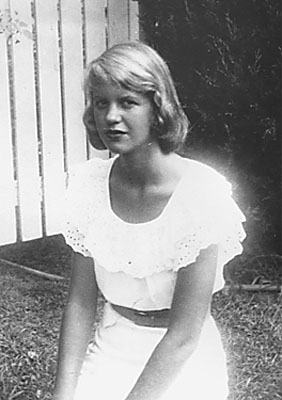
Sylvia Plath was one of the first and best of the modern confessional poets. She
won a Pulitzer Prize posthumously for her Collected Poems after
committing suicide at the age of 31, something she seemed to have been
predicting in her writing and practicing for in real life. Did she ask "Who'd
walk in this bleak place?" as a prelude to perhaps the most agonizing labor of
all: suicide?
Winter landscape, with rocks
by Sylvia Plath
Water in the millrace, through a sluice of stone,
plunges headlong into that black pond
where, absurd and out-of-season, a single swan
floats chaste as snow, taunting the clouded mind
which hungers to haul the white reflection down.
The austere sun descends above the fen,
an orange cyclops-eye, scorning to look
longer on this landscape of chagrin;
feathered dark in thought, I stalk like a rook,
brooding as the winter night comes on.
Last summer's reeds are all engraved in ice
as is your image in my eye; dry frost
glazes the window of my hurt; what solace
can be struck from rock to make heart's waste
grow green again? Who'd walk in this bleak place?
Sir Thomas Wyatt has been credited with introducing
the Petrarchan sonnet into the English language. His father, Henry Wyatt, had
been one of Henry VII's Privy Councilors, and remained a trusted adviser when
Henry VIII came to the throne in 1509. Thomas Wyatt followed his father to
court. But it seems the young poet may have fallen in love with the king’s
mistress. Many legends and conjectures suggest that an unhappily married Wyatt
had a relationship with Anne Boleyn. Their acquaintance is certain, but whether
or not the two actually shared a romantic relationship remains unknown. But in
his poetry, Wyatt called his mistress Anna, and sometimes embedded pieces of
information that seem to correspond with her life. For instance, this poem might
well have been written about the King’s claim on Anne Boleyn, which made Wyatt's
pursuit impossible ...
Whoso List to Hunt
by Sir Thomas Wyatt
Whoso list to hunt, I know where is an hind,
But as for me, alas, I may no more.
The vain travail hath wearied me so sore,
I am of them that farthest cometh behind.
Yet may I by no means my wearied mind
Draw from the deer, but as she fleeth afore
Fainting I follow. I leave off therefore,
Since in a net I seek to hold the wind.
Who list her hunt, I put him out of doubt,
As well as I, may spend his time in vain.
And graven with diamonds in letters plain
There is written, her fair neck round about:
Noli me tangere, for Caesar's I am,
And wild for to hold, though I seem tame.
Noli me tangere means "Touch me not." According to the Bible, this is
what Jesus said to Mary Magdalene when she tried to embrace him after the
resurrection. So perhaps after Anne Boleyn's betrothal to Henry, religious vows also
entered into the picture, and left Wyatt out.
Find Work
by Rhina P. Espaillat
I tie my Hat—I crease my Shawl—
Life's little duties do—precisely
As the very least
Were infinite—to me—
—Emily Dickinson, #443
My mother’s mother, widowed very young
of her first love, and of that love’s first fruit,
moved through her father’s farm, her country tongue
and country heart anaesthetized and mute
with labor. So her kind was taught to do—
“Find work,” she would reply to every grief—
and her one dictum, whether false or true,
tolled heavy with her passionate belief.
Widowed again, with children, in her prime,
she spoke so little it was hard to bear
so much composure, such a truce with time
spent in the lifelong practice of despair.
But I recall her floors, scrubbed white as bone,
her dishes, and how painfully they shone.
Hart Crane's poem "To Brooklyn Bridge" describes the
madness of modern city life ...
To Brooklyn Bridge
by Hart Crane
How many dawns, chill from his rippling rest
The seagull's wings shall dip and pivot him,
Shedding white rings of tumult, building high
Over the chained bay waters Liberty—
Then, with inviolate curve, forsake our eyes
As apparitional as sails that cross
Some page of figures to be filed away;
—Till elevators drop us from our day ...
I think of cinemas, panoramic sleights
With multitudes bent toward some flashing scene
Never disclosed, but hastened to again,
Foretold to other eyes on the same screen;
And Thee, across the harbor, silver-paced
As though the sun took step of thee, yet left
Some motion ever unspent in thy stride,—
Implicitly thy freedom staying thee!
Out of some subway scuttle, cell or loft
A bedlamite speeds to thy parapets,
Tilting there momently, shrill shirt ballooning,
A jest falls from the speechless caravan.
Down Wall, from girder into street noon leaks,
A rip-tooth of the sky's acetylene;
All afternoon the cloud-flown derricks turn ...
Thy cables breathe the North Atlantic still.
And obscure as that heaven of the Jews,
Thy guerdon ... Accolade thou dost bestow
Of anonymity time cannot raise:
Vibrant reprieve and pardon thou dost show.
O harp and altar, of the fury fused,
(How could mere toil align thy choiring strings!)
Terrific threshold of the prophet's pledge,
Prayer of pariah, and the lover's cry,—
Again the traffic lights that skim thy swift
Unfractioned idiom, immaculate sigh of stars,
Beading thy path—condense eternity:
And we have seen night lifted in thine arms.
Under thy shadow by the piers I waited;
Only in darkness is thy shadow clear.
The City's fiery parcels all undone,
Already snow submerges an iron year ...
O Sleepless as the river under thee,
Vaulting the sea, the prairies' dreaming sod,
Unto us lowliest sometime sweep, descend
And of the curveship lend a myth to God.
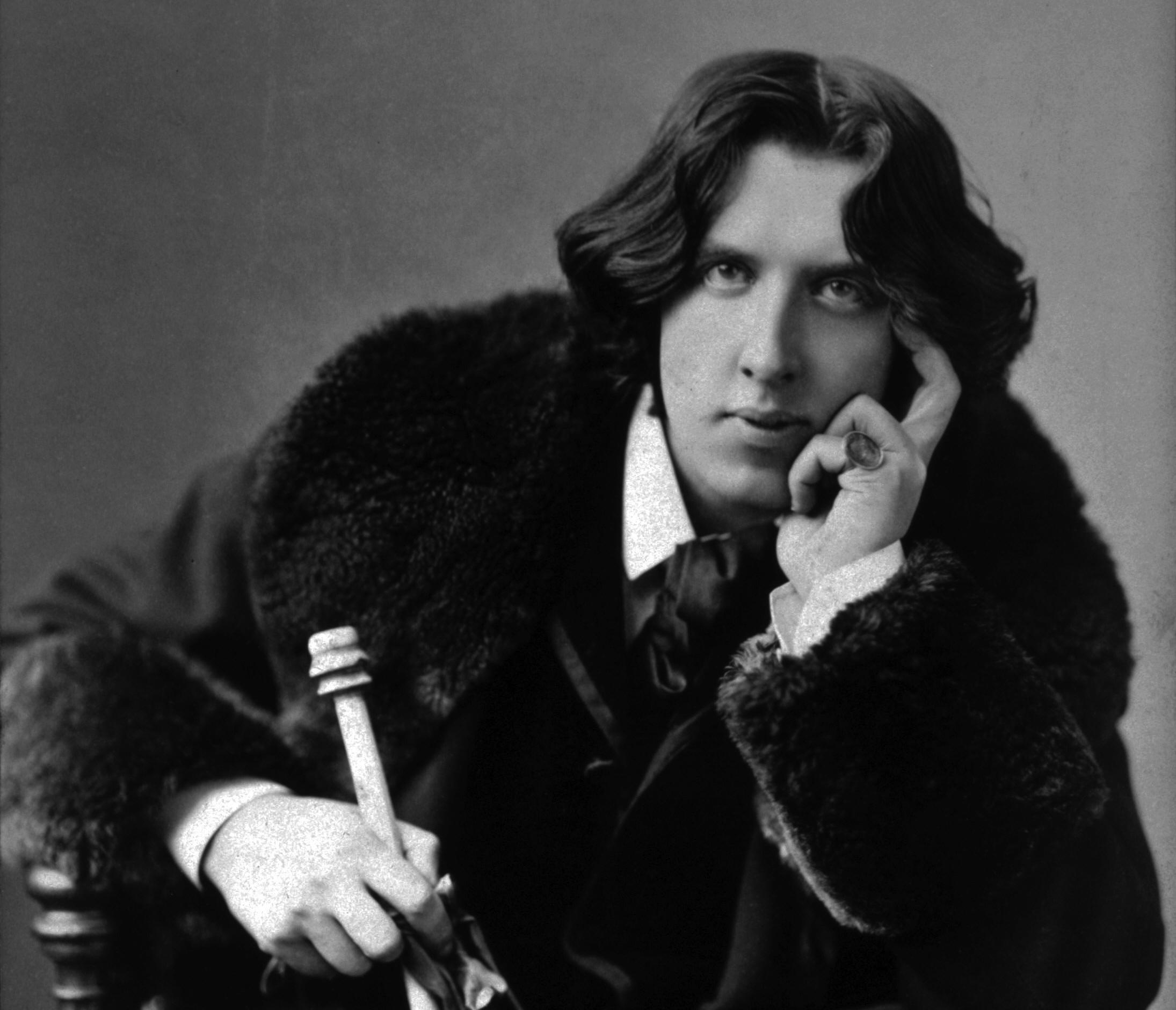
Oscar Wilde may be the most notorious "bad boy" in the annals of poetry and
literature. He was flamboyantly gay at a time when polite society was prim,
proper and violently homophobic. As a result, he was sentenced to hard labor at
Reading Gaol and died soon after his release. Wilde is justly famous today for
his disdain for "respectability" and dull and dulling conformity, as his witty
epigrams prove. But the lovely, wonderfully moving poem below proves that he was
also a true poet, able to describe the wrenching loss of his sister so that we
can feel it too ...
Requiescat
by Oscar Wilde
Tread lightly, she is near
Under the snow,
Speak gently, she can hear
The daisies grow.
All her bright golden hair
Tarnished with rust,
She that was young and fair
Fallen to dust.
Lily-like, white as snow,
She hardly knew
She was a woman, so
Sweetly she grew.
Coffin-board, heavy stone,
Lie on her breast,
I vex my heart alone,
She is at rest.
Peace, Peace, she cannot hear
Lyre or sonnet,
All my life's buried here,
Heap earth upon it.
These are poems of mine on the subject of work, labor and human toil ...
My sister Debby majored in accounting and became a CPA, so I wrote this poem for
her:
Liquidity Crisis
by Michael R. Burch
And so I have loved you, and so I have lost,
accrued disappointment, ledgered its cost,
debited wisdom, credited pain . . .
My assets remaining are liquid again.
Eerie Dearie
by Michael R. Burch
A trembling young auditor, white
as a sheet, like a ghost in the night,
saw his dreams, his career
in a poof!, disappear,
and then, strangely Enronic, his wife.
Fortune named Enron "America's Most Innovative Company" for six consecutive
years, but the company went bankrupt and vanished after its accounting practices
were determined to be fraudulent.
The Locker
by Michael R. Burch
All the dull hollow clamor has died
and what was contained,
removed,
reproved
adulation or sentiment,
left with the pungent darkness
as remembered as the sudden light.
Ironic Vacation
by Michael R. Burch
Salzburg.
Seeing Mozart’s baby grand piano.
Standing in the presence of sheer incalculable genius.
Grabbing my childish pen to write a poem
& challenge the Immortals.
Next stop, the catacombs!
Orpheus
by Michael R. Burch
for and after William Blake
I.
Many a sun
and many a moon
I walked the earth
and whistled a tune.
I did not whistle
as I worked:
the whistle was my work.
I shirked
nothing I saw
and made a rhyme
to children at play
and hard time.
II.
Among the prisoners
I saw
the leaden manacles
of Law,
the heavy ball and chain,
the quirt.
And yet I whistled
at my work.
III.
Among the children’s
daisy faces
and in the women’s
frowsy laces,
I saw redemption,
and I smiled.
Satanic millers,
unbeguiled,
were swayed by neither girl,
nor child,
nor any God of Love.
Yet mild
I whistled at my work,
and Song
broke out,
ere long.
Progress
by Michael R. Burch
There is no sense of urgency
at the local Burger King.
Birds and squirrels squabble outside
for the last scraps of autumn:
remnants of buns,
goopy pulps of dill pickles,
mucousy lettuce,
sesame seeds.
Inside, the workers all move
with the same très-glamorous lethargy,
conserving their energy, one assumes,
for more pressing endeavors: concerts and proms,
pep rallies, keg parties,
reruns of Jenny McCarthy on MTV.
The manager, as usual, is on the phone,
talking to her boyfriend.
She gently smiles,
brushing back wisps of insouciant hair,
ready for the cover of Glamour or Vogue.
Through her filmy white blouse
an indiscreet strap
suspends a lace cup
through which somehow the nipple still shows.
Progress, we guess, ...
and wait patiently in line,
hoping the Pokémons hold out.
The Procrastinator’s Creed
by Michael R. Burch
It’s always, “Tomorrow, I’ll do it.”
Work? I eschew it.
I never collect money I’ve loaned
and the rest of this poem’s been postponed.
Arse Brevis, Emendacio Longa
by Michael R. Burch
The Donald may tweet from sun to sun,
but his spellchecker’s work is never done.
What Works
by Michael R. Burch
for David Gosselin
What works—
hewn stone;
the blush the iris shows the sun;
the lilac’s pale-remembered bloom.
The frenzied fly: mad-lively, gay,
as seconds tick his time away,
his sentence—one brief day in May,
a period. And then decay.
A frenzied rhyme’s mad tip-toed time,
a ballad’s languid as the sea,
seek, striving—immortality.
When gloss peels off, what works will shine.
When polish fades, what works will gleam.
When intellectual prattle pales,
the dying buzzing in the hive
of tedious incessant bees,
what works will soar and wheel and dive
and milk all honey, leap and thrive,
and teach the pallid poem to seethe.
During the coronavirus pandemic, I wrote a series of haiku about working during
such a catastrophe ...
Iffy Coronavirus Haiku
yet another iffy coronavirus haiku #1
by michael r. burch
plagued by the Plague
i plague the goldfish
with my verse
yet another iffy coronavirus haiku #2
by michael r. burch
sunflowers
hang their heads
embarrassed by their coronas
I wrote this poem after having a sunflower arrangement delivered to my mother,
who was in an assisted living center and couldn’t have visitors due to the
pandemic.
homework: yet another iffy coronavirus haiku #3
by michael r. burch
dim bulb overhead,
my silent companion:
still imitating the noonday sun?
yet another iffy coronavirus haiku #4
by michael r. burch
Spring fling—
children string flowers
into their face masks
yet another iffy coronavirus haiku #5
by michael r. burch
the Thought counts:
our lips and fingers
insulated by plexiglass ...
yet another iffy coronavirus haiku #6
by michael r. burch
masks, masks
everywhere
and not a straw to drink ...
Dark Cloud, Silver Lining
by Michael R. Burch
Every corona has a silver lining:
I’m too far away to hear your whining,
and despite my stormy demeanor,
my hands have never been cleaner!
New World Order (last in a series and perhaps of a species)
by Michael R. Burch
The days of the dandelions dawn ...
soon man will be gone:
fertilizer.
Other Labor Day Poems of Note
One Art by Elizabeth Bishop
Jerusalem
by William Blake
Dulce Et Decorum Est
by Wilfred Owen
The Unreturning
by Wilfred Owen
The Garden
by Ezra Pound
Naming of Parts
by Henry Reed
An Irish Airman Foresees His Death by William Butler Yeats
I Can by Ralph Waldo Emerson
Find Work by Rhina P. Espaillat
I Hear America Singing by Walt Whitman
Brass Spittoons and Minstrel Man
by Langston Hughes
What Work Is by Philip Levine
Poet’s Work by Lorine Niedecker
Shirt by Robert Pinsky
Absalom by Muriel Rukeyser
The Song of the Wage-slave by Robert W. Service
Factory by Charles Simic
Related pages:
The Best Sonnets,
The Best Villanelles,
The Best Ballads,
The Best Sestinas,
The Best Rondels and Roundels,
The Best Kyrielles,
The Best Couplets,
The Best Quatrains,
The Best Haiku,
The Best Limericks,
The Best Nonsense Verse,
The Best Poems for Kids,
The Best Light Verse,
The Best Poem of All Time,
The Best Poems Ever Written,
The Best Poets,
The Best of the Masters,
The Most Popular Poems of All Time,
The Best American Poetry,
The Best Poetry Translations,
The Best Ancient Greek Epigrams and Epitaphs,
The Best Anglo-Saxon Riddles and Kennings,
The Best Old English Poetry,
The Best Lyric Poetry,
The Best Free Verse,
The Best Story Poems,
The Best Narrative Poems,
The Best Epic Poems,
The Best Epigrams,
The Most Beautiful Poems in the English Language,
The Most Beautiful Lines in the English Language,
The Most Beautiful Sonnets in the English Language,
The Best Elegies, Dirges & Laments,
The Best Poems about Death and Loss,
The Best Holocaust Poetry,
The Best Hiroshima Poetry,
The Best Anti-War Poetry,
The Best Religious Poetry,
The Best Spiritual Poetry,
The Best Heretical Poetry,
The Best Thanksgiving Poems,
The Best Autumnal Poems,
The Best Fall/Autumn Poetry,
The Best Dark Poetry,
The Best Halloween Poetry,
The Best Supernatural Poetry,
The Best Dark Christmas Poems,
The Best Vampire Poetry,
The Best Love Poems,
The Best Urdu Love Poetry,
The Best Erotic Poems,
The Best Romantic Poetry,
The Best Love Songs,
The Ten Greatest Poems Ever Written,
The Greatest Movies of All Time,
England's Greatest Artists,
Visions of Beauty,
What is Poetry?,
The Best Abstract Poetry,
The Best Antinatalist Poems and Prose,
Early Poems: The Best Juvenilia,
Human Perfection: Is It Possible?,
The Best Book Titles of All Time
The HyperTexts






